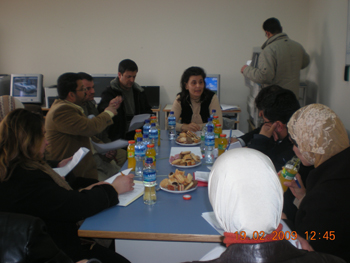PCDIC Conducts a Workshop About the Health and Economic Implications of Mycotoxins in Food Commodities
PCDIC Conducts a Workshop About the Health and Economic Implications of Mycotoxins in Food Commodities
The Poison Control and Drug Information Center (PCDIC) conducted a workshop about aflatoxins, food contamination, and methods of prevention. Dr. Ansam Sawalha organized the workshop as a response to increasing international concern over aflatoxins, and the health and economic losses resulting from contamination of food and feed with mycotoxin. Participants in the workshop included Dr. Fadi Bani Shamseh, Poison Information Specialist; representatives from the Ministry of Health, Ministry of National Trade, Palestinian Standards Institute, and the Consumer Protection Agency.
For an introduction, Dr. Sawalha briefed the participants on the subject of aflatoxins and mycotoxins; stating that they are naturally occurring toxic substances produced by certain species of fungi under special conditions. Aflatoxins, an important group of mycotoxins, are produced mainly by Aspergillus, Fusarium and Penicillum fungal genus. Commodities that are mostly at risk for aflatoxin formation are oil seeds, cereals, nuts, dried and fruits; while some dairy products may become contaminated with M1 and M2. Dr. Sawalha mentioned that mould growth and mycotoxin formation depend on factors such as environmental conditions (RH% and temperature) and food substrate (Moisture content/aw of the foods). The health hazards of aflatoxins may be acute or chronic, and can range from death to affecting the central nervous, cardiovascular, pulmonary and digestive systems. Mycotoxins may also be carcinogenic, mutagenic, teratogenic, and immunosuppressive. Aflatoxin is specifically designated as a human carcinogen.
Dr. Sawalha spoke about the methods used for preventing the formation of mycotoxins, which may include:
· GAP (Good Agricultural Practices) in the field (irrigation, pest control, fertilizers)
· Harvesting at the right maturity time
. Minimizing physical damage on crops
. Drying crops in a short time to save moisture
.Controlled storage (RH%, temperature, air circulation, etc.),
.Packaging and transportation
.GMP (Good Manufacturing Practices)
Additionally, Dr. Sawalha emphasized that the best way is prevention from contamination, but in case of contamination, the following decontamination methods are being used:
• Biological control
• Food processing
• Sorting
• Treatments with chemicals
At the end of the workshop, all participants agreed to help in keeping food and feed free of mycotoxin contamination, to perform tests on food commodities, and to educate others on prevention methods. Dr. Sawalha asked that they use two steps that are similar to international strategies for minimizing mycotoxins in the global food supply. The first is “establishing ALARA limits through monitoring the national food supply by collecting and analyzing domestic and import foods.” The second is “establishing guidelines to achieve the ALARA limits.” ALARA is “As Low As Reasonably Achievable”. This will uplift the standards of Palestinian products and will make them more marketable outside Palestine in addition to protecting the health of Palestinian citizens.



